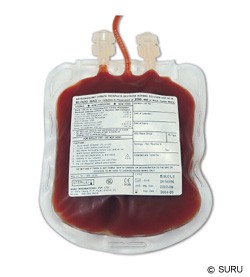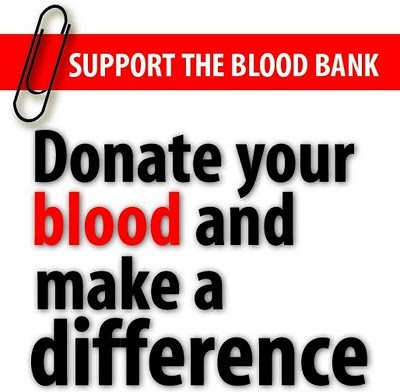The Jeevan Amrit Yojana
 For the first time in this country, a scheme to facilitate blood supply on call to patients scheduled to undergo surgeries and medical procedures, at cheaper rate is implemented. The scheme is implemented in Maharashtra State which is called ‘Jeevan Amrit Yojana. The dedicated helpline number for this scheme is 104. After receiving a call, blood will be supplied within an hour to the patient. The scheme is widened to entire state following its successful implementation on the pilot basis in Satara and Sindhudurg districts. The timely blood supply will reduce hardships faced by patients and their relatives in procuring blood in the hour of emergency. Under the scheme, the request for blood will have to be placed by hospitals.
For the first time in this country, a scheme to facilitate blood supply on call to patients scheduled to undergo surgeries and medical procedures, at cheaper rate is implemented. The scheme is implemented in Maharashtra State which is called ‘Jeevan Amrit Yojana. The dedicated helpline number for this scheme is 104. After receiving a call, blood will be supplied within an hour to the patient. The scheme is widened to entire state following its successful implementation on the pilot basis in Satara and Sindhudurg districts. The timely blood supply will reduce hardships faced by patients and their relatives in procuring blood in the hour of emergency. Under the scheme, the request for blood will have to be placed by hospitals.
The patients will have to pay Rs 450 towards the cost of blood and Rs 50 to Rs 100 as the cost of transportation depending on the distance involved. After receiving the call, the required blood and blood components will be transported on motorcycle to hospitals and nursing homes in specially fitted cold storage boxes. Sounds really good!!
Although, the lifesaving scheme needs to be highly praised, it faces logistical challenges. The ground staff executing the scheme say the promise of delivering blood within an hour is unfeasible as cross-matching a patient’s blood sample itself takes an hour. Besides, this transportation time for sample collection and then delivery of blood pouches, which is too long a waiting period. Hence its viability looks challenging. Health officials have also expressed fear that the NGOs roped in to transport blood pouches at a meager payment by the state may withdraw if they think they are spending more than they are making. However, top officials are hopeful that with the help of technology and inclusion of more blood storage centers; these challenges will be overcome in the next few months.
The modus operandi of the scheme works like this: once the request is placed with the call centre by dialing 104, a technician appointed by an NGO goes to the hospital on a motorcycle to collect the patient’s blood sample. After he comes back to the blood bank, cross-matching is done, a process that takes at least an hour. Again, the transport time involved in fetching the patient’s blood sample and then delivering blood pouches will take another hour, which means at least two hours are needed to deliver the right type of blood to the patient.
 Another hindrance in the scheme is meager salaries paid to the technicians. The state government has roped in NGOs to run the scheme effectively. Every state-run blood bank recruits there technicians or ‘arogya sevaks’ which are attached to district hospitals, who work in shifts. As per the arrangement, the state government currently gives Rs 16,000 collectively for three technicians. The NGOs bear the fuel cost, motorcycle repair and maintenance. Initially, the NGOs agreed to offer services at this cost but now they are irritated and have started grumbling. If this continues and the NGOs attached to the hospital blood banks withdraw their services, the scheme will crumple. An NGO spokesperson said, that they dint expect such an overwhelming response and hence they agreed to monthly salary of Rs 16,000 which is way too low. The NGOs have realized that it is not possible to transport blood pouches at such a low amount. Besides, they need at least two technicians to transport blood in each shift as one person cannot fulfill the requirements.
Another hindrance in the scheme is meager salaries paid to the technicians. The state government has roped in NGOs to run the scheme effectively. Every state-run blood bank recruits there technicians or ‘arogya sevaks’ which are attached to district hospitals, who work in shifts. As per the arrangement, the state government currently gives Rs 16,000 collectively for three technicians. The NGOs bear the fuel cost, motorcycle repair and maintenance. Initially, the NGOs agreed to offer services at this cost but now they are irritated and have started grumbling. If this continues and the NGOs attached to the hospital blood banks withdraw their services, the scheme will crumple. An NGO spokesperson said, that they dint expect such an overwhelming response and hence they agreed to monthly salary of Rs 16,000 which is way too low. The NGOs have realized that it is not possible to transport blood pouches at such a low amount. Besides, they need at least two technicians to transport blood in each shift as one person cannot fulfill the requirements.
According to a few medical officials, the scheme is not suitable for emergency cases; they suggest people should go to a blood bank attached to a hospital or the nearest blood bank, which will save the transportation time.
According to Dr. Sanjay Jadhav, Assistant Director of the State Blood Transfusion Council (SBTC), which is implementing the scheme on behalf of the state government, by end of March 2015, all the issues will be resolved. The SBTC is going to introduce advanced technology in blood cross-matching, so that the procedure can be finished in 20 minutes. Currently, there are 135 blood storage centers at rural hospitals and primary health centers, another 100 blood storage centers will be added by the end of March. This will reduce the time involved in delivering blood pouches. The NGOs will also be adequately compensated so that they do not incur losses.
In Mumbai, JJ City Blood Bank, Dr Babasaheb Ambedkar Railway Hospital at Byculla and Mumbai Port Trust are selected for the project. In the next phase, this service will be available at Bhabha Hospital at Kurla, ESIC Hospital in Mulund, Sub-District hospital in Malad Malvani, Shatabdi Hospital in Kandivali and Vasai Corporation Hospital as well.
The State Government’s initiative is highly appreciable. The initial teething problems in logistics can be solved with firm determination. 












































